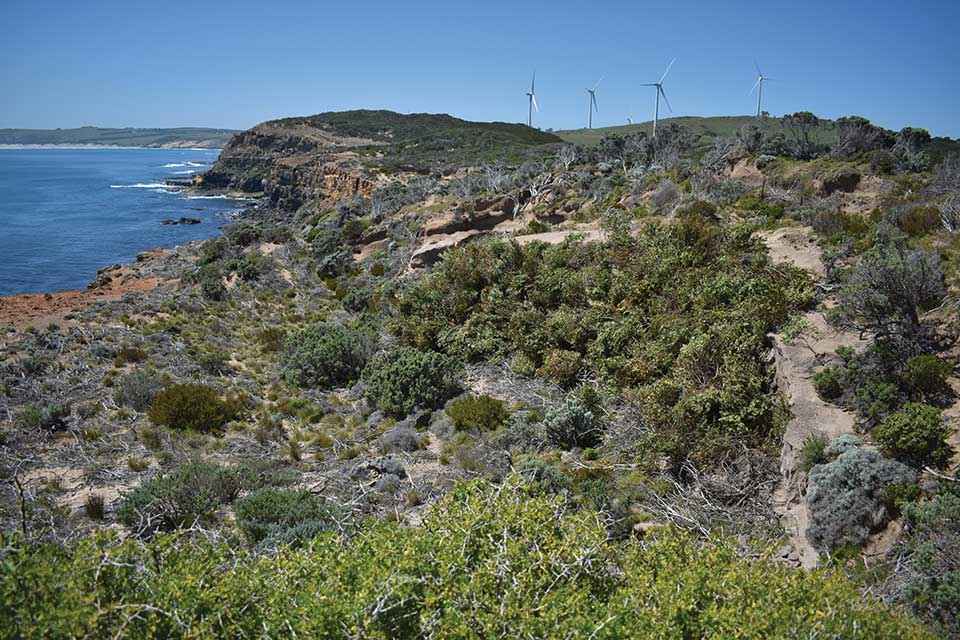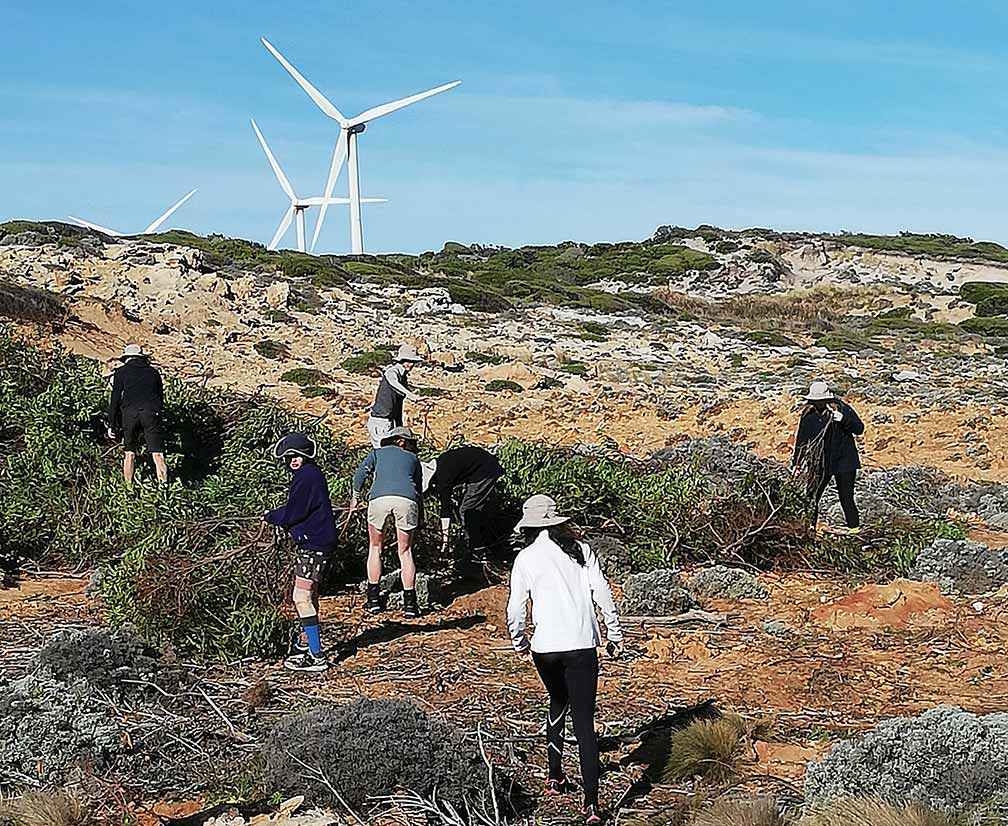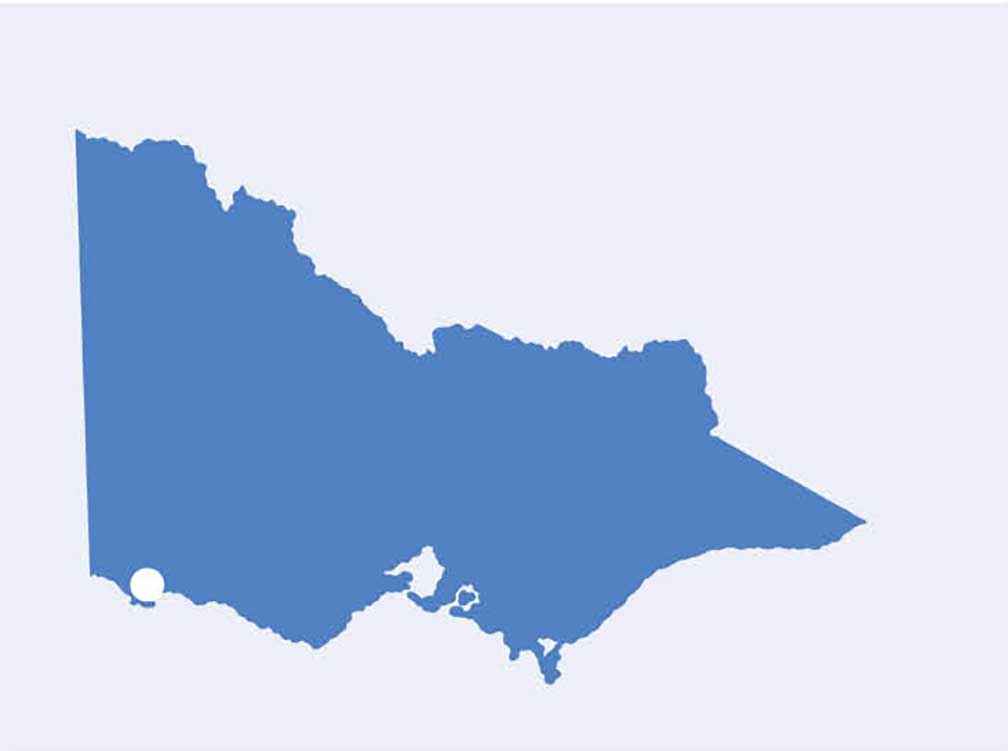Victorian Landcare Magazine - Spring 2020, Issue 79

The Great South West Walk is a bushwalking trail comprising short loop walks, full day walks and an intrepid, spectacular 250-kilometre coastal loop that begins and ends in Portland.
The Friends of the Great South West Walk (FGSWW) formed in 1984 and has around 140 members.
The FGSWW has been working on erosion control and revegetation along the spectacular cliff-top section of the walk from Springs Camp to Cape Bridgewater with the aim of improving the landscape and also reducing degradation and maintenance required on the walk. Historic overgrazing, combined with wind and water erosion, has reduced soil and vegetation cover, exposing rugged rock along the cliff-top walk.
The FGSWW Landcare team holds an annual planning meeting to determine working party timelines and tasks. The Landcare team’s Tuesday Gang volunteer weekly on track maintenance and preparing projects for larger groups of volunteers.
FGSWW has been working with Year 8 outdoor education students from Melbourne’s Wesley College for almost 25 years. Approximately 350 Wesley students visit the region to camp each year and spend around 1.5 hours a day for the two days of their hike working on the trail.

Above: Wesley College students working along the walk.
The reliable, ongoing contribution of Wesley College has enabled FGSWW to accumulate photographic records and statistical data over time which demonstrate rates of success on different sections of the walk. This is of great assistance with forward planning.
Earlier this year the Tuesday Gang cut and carted coastal wattle, delivering it some distance over difficult terrain to exposed sections of the walk such as the Basalt Lookout and Twin Pools. Volunteer teams then cut, rolled and laid lengths of hessian mesh from bales delivered on site, to stem rapid erosion degradation on steeper slopes and along the track before the students arrived. Wesley students and staff then weaved the coastal wattle into the mesh, re-covering and extending a large exposed area.
It was encouraging to see cushion bush and common tussock regenerating in the area once shelter was established. More varied regeneration will now follow. For our final working bee for the year the Tuesday Gang and Wesley students worked together to protect the large exposed sand dune face at Peacocks Blow. It was estimated that Wesley students and staff contribute around 1200 hours of environmental work to the walk each year.
Bill Golding, founding member of FGSWW loves working alongside the students.
“When you work with these incredible Wesley kids, you come home walking on air,” Bill said.
COVID-19 saw the most recent Wesley camp cancelled but plans are now in place for a number of camps later in 2020. FGSWW is grateful to the Glenelg Hopkins CMA for a Victorian Landcare Grant to fund materials.
The team is encouraged by the growing band of volunteers who willingly give of their time, energy and expertise. An association with the local South West TAFE College, Portland Campus, has recently been established. Running successful and enjoyable working bees means many volunteers return, often with new recruits. They make positive connections and have a worthwhile experiencing improving our natural environment in a spectacular coastal location.
FGSWW has received a number of awards for its work including a prestigious Parks Victoria Banksia Foundation Award and a Victorian Landcare Award. The awards acknowledge the valuable voluntary commitment and time dedicated to ensuring the continuation of Landcare on the Great South West Walk.
Jen Johns is a member of the FGSWW.
For more information go to www.greatsouthwestwalk.com or email friends@greatsouthwestwalk.com

Above: Location map - Portland